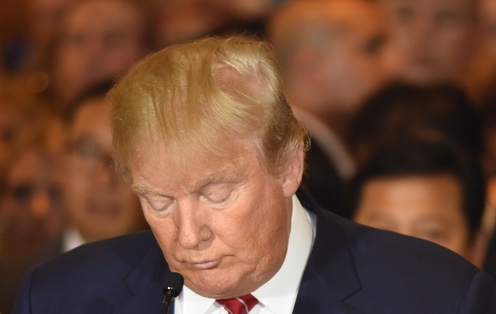Donald Trump’s mashed potato humiliation

That human free will is an illusion is a philosophical position that has gained renewed traction in recent years. I have no problem with it per se. If it’s true, it’s true, and I’m not about to take up arms against a proposition merely because I don’t like it (and I don’t).
But it seems to me that strict adherents to the idea that everything we do is foreordained, that we cannot change those things even if we want to, must make certain concessions. If they want to be consistent one of those concessions is they should subscribe to the old-fashioned idea that to understand all is to forgive all. In other words, if you understand that the guy who murdered your parents had no choice but to murder your parents then you must forgive him. What would be the point of blaming a computer for doing that which it was programmed to do?
I hope you see the problem right away. We need blame in order to fuel our outrage against people like Donald Trump so we can use the anger derived from it as fuel for change. Otherwise we are free to merely shake our heads and say, “that’s just Donald,” not unlike the way, say, Jim Jordan, when told the wrestling team doctor was sexually assaulting members of his team, shook his head and said, “that’s just Dr. Strauss.”
Accountability keeps us in line, and makes those naughty things we are allegedly programmed to do all the harder to pull off and justify. And if it changes our underlying programming enough to make a positive difference then I, for one, am all for it.
All of which leads me to Mary J. Trump’s recent book, “Too Much and Never Enough.” I only this week acquired an audiobook version of it and began listening yesterday. It explains much of what is wrong with Donald Trump, and there’s a lot that’s wrong with Donald Trump. People who have read the book and said it tells us nothing new are only right technically. The details explain much and forgive nothing. And there is plenty of devil in the details.
One such detail stems from an anecdote when Trump was 7 years old, that became known in Trump family lore as the mashed potato incident. Trump’s sister Maryanne mentioned the incident at her White House birthday dinner in 2017. Everybody gathered that night laughed with good-natured nostalgia at the anecdote. Everybody but Donald Trump. He was president of the United States and he only scowled. Trump couldn’t find it in himself to see a bit of humor from innocent childhood tomfoolery. His giant ego at 71, just fed the world’s biggest banquet by being elected president of the United States, was as brittle and needy and insecure as it was when he was 7. And every bit as malignant.
Even back when he was 7, Trump was a relentless, vicious bully, a monster in training. He went to great lengths to make his younger brother Robert’s life an unending agony.
In her book, Mary Trump described the mashed potato incident this way: “Donald had been tormenting Robert (again) and no one could get him to stop. Even at seven, he felt no need to listen to his mother, who, having failed to heal the rift between them after her illness, he treated with contempt. Finally Robert’s crying and Donald’s needling became too much, and in a moment of improvised expedience that would become family legend, [Donald’s older brother] Freddie picked up the first thing at hand that wouldn’t cause any real damage, the bowl of mashed potatoes.”
Freddie then upended the mashed potatoes on little Donald’s head. “Everybody laughed, and they couldn’t stop laughing. And they were laughing *at* Donald. It was the first time Donald had been humiliated by someone he even then believed to be beneath him.”
It was an incident Trump would never forget, an incident from which he took the wrong lesson. Trump never made the broader connection that being humiliated can hurt others too. He only saw that it hurt him.
Trump never makes generic extrapolations when they are readily available to his “stable genius.” That is why he feels free to insult others with impunity, but reacts with inflamed outrage when they respond in kind. After the mashed potato incident Trump would never allow the whip hand of humiliation to be in any hand but his. Or as Mary Trump put it, “From then on, he would wield the weapon, never be at the sharp end of it.”
I find much in this story to explain Donald Trump, but nothing in it to forgive him. He decided to be a monster, and he kept deciding to be a monster. Many people had far, far worse lives than he, and turned out magnificent. Oprah Winfrey comes to mind. Frederick Douglass comes to mind. Why did they choose to be good from a starting place infinitely worse than Trump’s? Because good might be more than programming. It just might be a choice made by our own free will. And, as ever, ladies and gentlemen, brothers and sisters, comrades and friends, stay safe.

Robert Harrington is an American expat living in Britain. He is a portrait painter.
